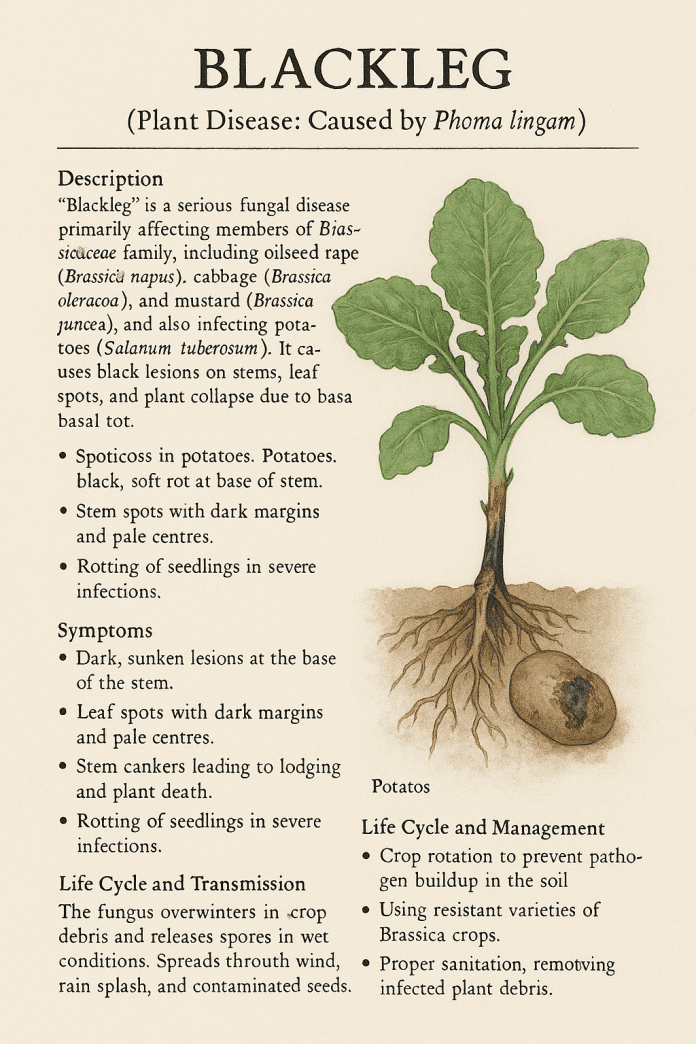Blackleg (Plant Disease: Caused by Phoma lingam and Pectobacterium atrosepticum)
Classification:
- Kingdom: Fungi / Bacteria
- Phylum: Ascomycota (Phoma lingam) / Proteobacteria (Pectobacterium atrosepticum)
- Class: Dothideomycetes (Phoma lingam) / Gammaproteobacteria (Pectobacterium atrosepticum)
- Order: Pleosporales (Phoma lingam) / Enterobacterales (Pectobacterium atrosepticum)
- Family: Didymellaceae (Phoma lingam) / Pectobacteriaceae (Pectobacterium atrosepticum)
- Genus: Phoma / Pectobacterium
- Species: Phoma lingam (syn. Leptosphaeria maculans) / Pectobacterium atrosepticum
Description:
Blackleg is a plant disease affecting members of the Brassicaceae family and potatoes (Solanum tuberosum). In brassicas, it is caused by the fungal pathogen Phoma lingam, while in potatoes, it is caused by the bacterial pathogen Pectobacterium atrosepticum. Both forms of the disease can lead to plant collapse and significant yield losses.
Symptoms:
Brassicas (Caused by Phoma lingam)
- Dark, sunken lesions at the base of the stem, often girdling the plant.
- Leaf spots with dark margins and pale centres, sometimes forming a “target” pattern.
- Cankers on stems leading to structural weakness and lodging.
- Seedling rot in early infections, causing plant death before maturity.
Potatoes (Caused by Pectobacterium atrosepticum)
- Black, soft, and slimy rot at the base of potato stems.
- Wilting and yellowing of foliage.
- Tuber infection leading to soft rot.
Life Cycle and Transmission:
Brassicas:
Phoma lingam survives in plant debris and soil, releasing spores under wet conditions. The fungus spreads through wind, rain splash, and contaminated seeds. Infection often begins in autumn or spring when humidity and temperature favour fungal growth. Once established, the disease progresses systemically through the plant.
Potatoes:
Pectobacterium atrosepticum spreads through infected seed potatoes, contaminated soil, and water. The bacteria enter through wounds or natural openings, thriving in wet, poorly drained conditions.
Control and Management:
For Brassicas:
- Crop Rotation: Avoid planting Brassica crops in the same field for consecutive seasons to reduce fungal buildup.
- Resistant Varieties: Use cultivars bred for blackleg resistance.
- Sanitation: Remove and destroy infected plant debris to limit spore production.
- Fungicides: Apply fungicides at key growth stages if conditions favour disease development.
- Seed Treatment: Use certified disease-free seeds and consider seed treatments to reduce early infection risk.
For Potatoes:
- Seed Selection: Use certified disease-free seed potatoes to prevent infection.
- Soil and Water Management: Ensure good drainage to reduce bacterial spread.
- Hygiene: Clean equipment and avoid handling plants when wet.
- Crop Rotation: Rotate potatoes with non-host crops to break the disease cycle.
Conclusion:
Blackleg is a destructive disease that can severely impact Brassica and potato yields. Integrated disease management, combining cultural practices, resistant varieties, and targeted control measures, is essential for effective prevention and mitigation.




